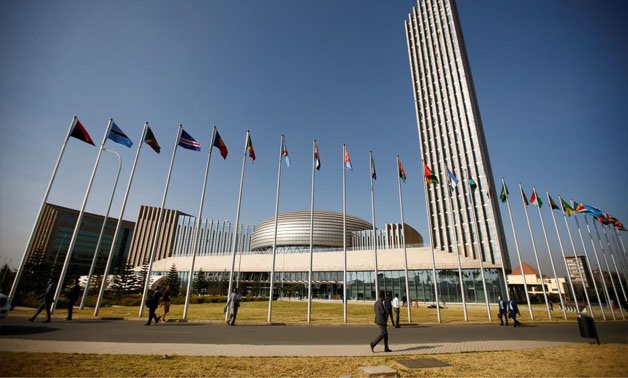
African Union headquarters in Addis Ababa - Reuters/Tiksa Negeri
CAIRO – 27 March 2018: Egypt and African Union member states are in the process of establishing the Continental Free Trade Area (CFTA) in order to boost trade and economic growth and strengthen integration among African countries.
According to the African Union, the objectives of the agreement is to create a single continental market for goods and services, with free movement of business persons and investments, and thus pave the way for accelerating the establishment of the Continental Customs Union and the African customs union.
A main objective of the agreement is to eliminate tariffs on intra-African trade in goods.
A recent study by the United Nations Conference on Trade and Development (UNCTAD) entitled “African Continental Free Trade Area: Challenges and Opportunities of Tariff Reductions “reviews the benefits and challenges of the agreement.
The report says that CFTA is widely seen as a crucial driver for economic growth, industrialization and sustainable development in Africa. But despite the opportunities, there are challenges that need to be addressed.
The study distinguishes between the short run and long run effects of the free trade agreement, saying that most of the potential benefits occur in the long run, while on the short run, there are structural challenges that entail costs of adjustment.
In the long-run, the study says that trade liberalization in the CFTA lowers trade costs and allows consumers to access a greater variety of products at lower prices.
Also, lower costs for imported raw materials and intermediate inputs increases competitiveness of downstream producers and promotes the generation of regional value chains.
The study assesses the long-run outcomes of the CFTA under different scenarios. In the case of full elimination of tariffs among African countries, welfare gains would amount to $16.1 billion, even after deducting $4.1 billion of tariff revenue losses, GDP is expected to grow by 0.97 percent and total employment will rise by 1.17 percent.
 Courtesy of UNCTAD report
Courtesy of UNCTAD report
Intra-African trade is also estimated to grow by 33 per cent and Africa's total trade deficit is cut in half.
In the case of partial tariff cuts that would exempt certain sensitive products from liberalization, including the sector with the highest current tariff revenue, the study shows a significantly reduced overall welfare gain of $10.7 billion in the long-run and a lower GDP and employment growth at 0.66 percent and 0.82 percent, respectively.
Intra-African trade is expected to grow by 24 per cent, but Africa's overall trade deficit only shrinks by 3.8 per cent.
“In both long-term scenarios, the largest employment growth rates are found in manufacturing industry followed by some services and agriculture subsectors. All sectors grow, with the exception of a stagnant mining sector. This is in line with the CFTA objective for structural transformation and industrialization,” the report says.
As for challenges, the study refers to “short-run structural change” through the relocation of labor, capital and other factors of production. It says that for the benefits from regional integration to occur, African countries have to reallocate resources within and between sectors.
The report explains that crucial private adjustment costs arise from temporary unemployment and lower wages in declining sectors, and similarly from underutilized capital.
Costs of upgrading labor skills or training for new skills are also part of private adjustment costs, the report says, adding that for the public sector, lower tariff revenues are the most pronounced concern in many developing countries.
“Sometimes transition periods can be very long and adjustment costs high in some economies.”
However, most empirical studies in the existing literature on trade liberalization tend to find that long-run gains outweigh short-run adjustment costs, according to the report.
 Courtesy of UNCTAD report
Courtesy of UNCTAD report
The report adds that not all countries are expected to benefit equally from the CFTA.
“While average GDP growth is about one percent, some countries may experience growth of over three per cent,” the report says.
Egypt’s Trade Minister Tarek kabil said that the agreement is an important step towards establishing the common African market, paving the way for an economic African union.
He said that the agreement will help achieve the African economic integration, enhance sustainable development and increase growth rates for African states in light of Africa’s vision 2063.
The CFTA is set to include all 55 member states of the African Union, but Nigeria and Uganda had pulled out at the last minute. Nigeria said it needs more time to review the terms.
Comments
Leave a Comment